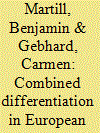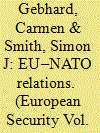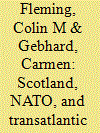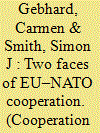|
|
|
Sort Order |
|
|
|
Items / Page
|
|
|
|
|
|
|
| Srl | Item |
| 1 |
ID:
190067


|
|
|
|
|
| Summary/Abstract |
Sustaining meaningful defense cooperation in Europe is made difficult by defense-industrial fragmentation, a multiplicity of institutional frameworks, divergent strategic cultures and domestic opposition to integration. The European Union’s recent foray into defense integration incorporates multiple forms of differentiation to overcome these barriers, with Permanent Structured Cooperation (PESCO) characterized by selective membership, external participation, and project-based clustering. Such “combined differentiation” offers an instructive example of how EU practices and principles can contribute to meaningful defense collaboration, even though Brussels is often thought a weak actor externally. It also illustrates how distinct forms of differentiation can be embodied within a single structure to accommodate complexity in strategic preferences. Using the example of PESCO, this article shows how “combined differentiation” has emerged as a response to the nature of the European defense landscape and how debates between member states about how to respond to specific challenges have brought about further differentiation over time.
|
|
|
|
|
|
|
|
|
|
|
|
|
|
|
|
| 2 |
ID:
154465


|
|
|
|
|
| Summary/Abstract |
Events in Ukraine have rekindled discussions about NATO’s post-Cold War purpose and the way it relates to the EU. Through EU sanctions and a traditional military response from NATO, the West has manoeuvred itself into a paradoxical situation where every step it takes to reassure its Eastern allies increases rather than diffuses tensions with Russia. On the one hand, it seems that decades of carefully crafted strategic narratives of de-escalation are now in limbo. On the other, it might have indeed been the sustained attempt to create a liberal post-Cold War order that produced an “integration dilemma”, and ultimately drove Russia to the defensive realist logic of a Waltzian “security dilemma”. We argue that NATO’s reaction might have been based on a stylised threat and historical resentments rather than on a carefully calculated risk. Looking beyond the EU and NATO’s recent strategic choices, we argue that the situation can only be resolved by re-engaging Russia in a renewed de-escalatory dialogue that involves both the EU and NATO with a greater emphasis on the nuanced, but important, distinctions between the integration and security dilemmas.
|
|
|
|
|
|
|
|
|
|
|
|
|
|
|
|
| 3 |
ID:
154461


|
|
|
|
|
| Summary/Abstract |
This article provides the framework for the contributions to this special issue. It first puts the theme into context and outlines the main issues that justify further analytical engagement with European Union (EU)–North Atlantic Treaty Organization (NATO) relations to the extent we propose here. We then provide some historical background to frame the discussion, and in doing so also outline the current state of interaction between the EU and NATO. We then briefly contextualise the changing strategic environment shaping the relationship, including recent proposals to implement their declared “strategic partnership”. This introduction then presents an overview of the existing literature to set the stage for a renewed look at the research agenda that has emerged over the last two decades. We close with an outline of the individual contributions to this special issue, which are presented in two sections: one focusing on theoretical and conceptual approaches to the study of EU of EU–NATO relations, and one on the inter-organisational relationship in practice, followed by a concluding synopsis and outlook.
|
|
|
|
|
|
|
|
|
|
|
|
|
|
|
|
| 4 |
ID:
154464


|
|
|
|
|
| Summary/Abstract |
Studies of the relationship between the EU and NATO often focus on the limitations of cooperation, be it at the political or the operational level. However, little is known about the functioning of the political institutional linkages between the EU and NATO. This article therefore studies the main decision-making bodies of the two organisations at the political, ambassadorial level, namely the Political and Security Committee (PSC) of the EU and the North Atlantic Council (NAC) in NATO, as well as their joint meetings. The article employs an inductive Grounded Theory approach, drawing on open-ended interviews with PSC and NAC ambassadors, which reveal direct insights from the objects of analysis. The findings emphasise the impact of both structural and more agency-related categories on decision-making in these three fora. The article thus addresses both the paucity of study on these bodies more broadly and the complete lacuna on joint PSC–NAC meetings specifically, warranting the inductive approach this article endorses.
|
|
|
|
|
|
|
|
|
|
|
|
|
|
|
|
| 5 |
ID:
108662


|
|
|
|
|
| Publication |
2011.
|
| Summary/Abstract |
European leaders frequently vaunt the European Union's distinctiveness in adopting and pursuing a comprehensive approach to security. The EU's profile as an international actor is designed to span across all dimensions of security. As a result, its security policy portfolio involves a large number of institutional actors and policies that need to be coordinated. The ambition of the EU to provide security in a comprehensive manner raises challenges at the politico-strategic level, at the level of operational and policy planning and in day-to-day implementation. So far, the field is lacking an inclusive analytical framework for the analysis of providing security through a distinctively comprehensive civil-military, economic and political organisation. This article seeks to close this gap by providing suggestions for how the wide range of issues related to comprehensive security could be structured, and by framing the matter theoretically and with reference to existing conceptual work and empirical research.
|
|
|
|
|
|
|
|
|
|
|
|
|
|
|
|
| 6 |
ID:
131633


|
|
|
|
|
| Publication |
2014.
|
| Summary/Abstract |
This article explores the political and strategic implications of Scottish Independence for existing transatlantic security arrangements. It examines the potential institutional, legal and political obstacles Scotland might face during the transition to independence and discusses the specific challenges in the area of security and defence, including the nuclear issue and the question of what form an independent Scottish Defence Force (SDF) would need to take to allow and facilitate integration in transatlantic security structures. It argues that a number of strategic and political issues could be mitigated in the course of negotiations between Edinburgh and London. Moreover, Scotland's geostrategic position and political orientation make it an important prospective partner in international security cooperation across the Eastern Atlantic, High North and North Sea, which suggests that an advanced partnership with NATO, and eventually full membership, seems like an option that is both politically viable and more likely than any scenario that predicts seeing an independent Scotland (IS) outside these structures. This challenges some of the main strategic and security political arguments against independence and thus seeks to spark a debate about the realistic options for Scotland should it become independent after 2016.
|
|
|
|
|
|
|
|
|
|
|
|
|
|
|
|
| 7 |
ID:
137642


|
|
|
|
|
| Summary/Abstract |
Maritime engagement in the Gulf of Aden is a puzzling case for anyone interested in the political and institutional problems underlying European Union–North Atlantic Treaty Organization (EU– NATO) cooperation. Although the EU’s operation NAVFOR ‘Atalanta’ and NATO’s ‘Ocean Shield’ operate in the same theatre and with similar mandates, there is no formal link between them. No joint planning has been envisaged, and no official task-sharing takes place. As this article aims to show, cooperation and coordination between EU and NATO forces at the operational and tactical levels have nevertheless worked surprisingly well. Two faces of EU–NATO cooperation become apparent: the political level is dominated by a permanent deadlock, while on the ground and at sea staff have developed a modus operandi that allows them to deliver fairly successfully in complementing yet detached operations. Based on 60 interviews with EU and NATO officials (2010–2013), this article illustrates how the operational and tactical levels have developed ways of coordinating efforts informally despite the lack of a formal framework. It aims to show to what extent and how they succeed at bypassing organizational boundaries and at overcoming political limitations. Although these practices are becoming increasingly institutionalized, it remains to be seen whether this will translate into formal changes.
|
|
|
|
|
|
|
|
|
|
|
|
|
|
|
|
|
|
|
|
|